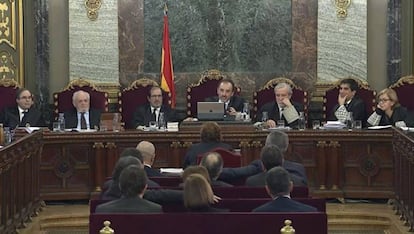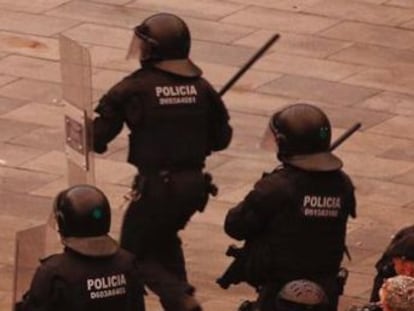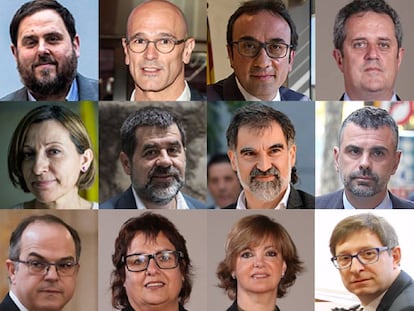Catalonia after the ruling
The Supreme Court sentence on the Catalan separatist leaders is the result of the strict application of the law, not a partisan or revenge-driven trial

When the Spanish Supreme Court’s ruling against the Catalan leaders who stood accused of declaring independence was made public on Monday, it brought to a close a judicial chapter of one of the most serious institutional crises ever faced by the democratic system born out of the 1978 Constitution.
Freedom of assembly should not be confused with resisting authority
The justices have unanimously concluded that nine of the defendants are guilty of sedition and that four of them additionally misused public funds. They have set out penalties ranging from nine to 13 years, proportionally to each individual’s degree of responsibility in the established facts. Following the same criteria, three of the political leaders who stood trial have been convicted of disobedience.
The effort to adapt the penalties according to each individual’s role, as underscored by the varying convictions, is proof in itself that the ruling reflects a strict application of criminal legislation in a rule of law, and not a partisan or revenge-driven trial.
Nor is the Supreme Court ruling the result of the judicialization of politics. As the ruling finds, secessionist leaders violated democratic laws with the goal of getting the central government to agree to call a popular poll on self-determination for Catalonia, and threatened to proceed with a unilateral independence declaration if the government refused. This declaration finally took place on October 27, 2017.
It is plain to see that the Supreme Court’s application of the criminal code will not solve the institutional crisis created by this strategy – a strategy that is undoubtedly political, though held up by illegality. But it is equally evident that just accepting that political strategies do not have to respect the limits set out by the criminal code in their pursuit of a solution would have planted the seeds of tyranny.
Catalan society needs to turn the page on a series of events that have caused division
As the seven justices in charge of the case have concluded, these limits are clear and they remain in force; thus, freedom of expression cannot be invoked to justify the decisions that were adopted in the Catalan parliament on September 6 and 7, 2017, repealing the Spanish Constitution and the Catalan charter of rights (Estatut) through a vote that was made possible by altering parliamentary rules and depriving the opposition of a voice.
Nor should freedom of assembly be confused with resisting authority, which is what took place in front of the Catalan economy department on September 20, 2017. Nor is it an exercise in freedom and civil rights to call a referendum on self-determination that is incompatible with national and international legislation, then to act on the threat of declaring independence on the strength of its supposed outcome.
Now that the court’s decision has been made public, the independence movement is torn between giving in to the temptation of making any political solution dependent on the fate of the convicted leaders, and accepting once and for all that its project is not viable and its own strength insufficient. The first choice would be a mistake, because it would mean giving unchecked leeway to the more radical forces that the independence movement has nurtured. Catalan society, just like Spanish society, needs to turn the page on a series of events that have caused division, dejection and uncertainty – not to mention suffering of the leaders who have now been sentenced to prison terms proportional to the gravity of their crimes. It is perfectly possible to acknowledge this suffering without shedding the belief that justice has been done at the Supreme Court and that it was essential that it be so.
Catalonia needs a regional charter
In order to emerge from the dead end where Catalan institutions have been stuck for a decade, and which some sectors of the independence movement want to prolong with the excuse of the court ruling, it is necessary to understand that the Supreme Court has not handed victory to this or that political position. Instead, it has ratified the victory of a democratic system built up since the end of the dictatorship through the determination, generosity and sacrifice of all citizens, including the citizens of Catalonia who were on the frontlines to defend the 1978 Constitution.
The territorial challenges that the independence movement tried to solve by imposing a unilateral solution have not changed since the failure of the Estatut was used for the same purposes that other, more radical forces are now using the court ruling for, as they block off roads and occupy public spaces. Then, as now, Catalonia needs a regional charter, not to appease those who defend independence or those who reject it, but simply to restore the legislative clarity and technical rigor required of a set of rules based on the Constitution. It is also necessary to draft a new regional financing law that will do justice to Catalonia, but also to all the other regions that have paid the price of a deep recession despite being less wealthy.
During these emotion-filled days, it would be naive to think that the Supreme Court’s ruling will make it easier to find a solution. Yet if both the independence movement and the main “constitutional” parties find a calm way out of this juncture, the ruling could, against all odds, represent a necessary turning point to facilitate an urgent agreement: setting the political agenda to start seeking that solution.
English version by Susana Urra.









































